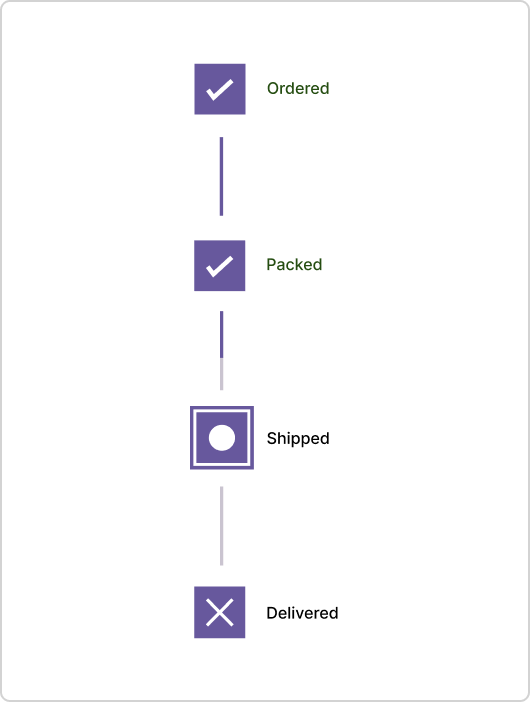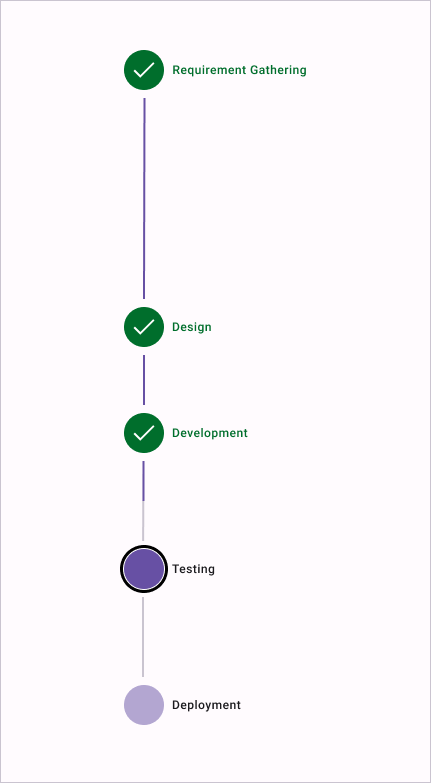Customizations in .NET MAUI StepProgressBar (SfStepProgressBar)
18 Mar 202524 minutes to read
You can highly customize the appearance of the Step progress bar background color, step size, content size, animations, and more.
Customize step shape
Customize the shape of the step by using the ShapeType property from StepSettings. By default the value of ShapeType is Circle.
<progressBar:SfStepProgressBar x:Name = "stepProgressBar" ItemsSource="{Binding ShipmentInfoCollection}"
ActiveStepIndex="2" ActiveStepProgressValue="50">
<progressBar:SfStepProgressBar.InProgressStepSettings>
<progressBar:StepSettings Background="#ff67579c" ContentType="Dot" ShapeType="Square" ContentFillColor="White"/>
</progressBar:SfStepProgressBar.InProgressStepSettings>
<progressBar:SfStepProgressBar.CompletedStepSettings>
<progressBar:StepSettings Background="#ff67579c" ContentType="Tick" ShapeType="Square" ContentFillColor="White"/>
</progressBar:SfStepProgressBar.CompletedStepSettings>
<progressBar:SfStepProgressBar.NotStartedStepSettings>
<progressBar:StepSettings Background="#ff67579c" ContentType="Cross" ShapeType="Square" ContentFillColor="White"/>
</progressBar:SfStepProgressBar.NotStartedStepSettings>
</progressBar:SfStepProgressBar>public MainPage()
{
InitializeComponent();
SfStepProgressBar sfstepProgressbar = new SfStepProgressBar()
{
ActiveStepIndex = 2,
ActiveStepProgressValue=50,
};
StepSettings inProgressStepSettings = new StepSettings();
inProgressStepSettings.Background = Color.FromHex("#ff67579c");
inProgressStepSettings.ContentType = StepContentType.Dot;
inProgressStepSettings.ShapeType = StepShapeType.Square;
inProgressStepSettings.ContentFillColor = Colors.White;
StepSettings completedStepSettings = new StepSettings();
completedStepSettings.Background = Color.FromHex("#ff67579c");
completedStepSettings.ContentType = StepContentType.Tick;
completedStepSettings.ShapeType = StepShapeType.Square;
completedStepSettings.ContentFillColor = Colors.White;
StepSettings notStartedStepSettings = new StepSettings();
notStartedStepSettings.Background = Color.FromHex("#ff67579c");
notStartedStepSettings.ContentType = StepContentType.Cross;
notStartedStepSettings.ShapeType = StepShapeType.Square;
notStartedStepSettings.ContentFillColor = Colors.White;
sfstepProgressbar.InProgressStepSettings = inProgressStepSettings;
sfstepProgressbar.NotStartedStepSettings = notStartedStepSettings;
sfstepProgressbar.CompletedStepSettings = completedStepSettings;
this.Content = sfstepProgressbar;
}
Customize step content
Customize the step content type by using the ContentType property with Numbering, Tick, Cross, Dot and Images.
<progressBar:SfStepProgressBar x:Name = "stepProgressBar"
StepSize="40"
StepContentSize="25"
ActiveStepIndex="1"
StepStrokeWidth="10"
ActiveStepProgressValue="60">
<progressBar:SfStepProgressBar.InProgressStepSettings>
<progressBar:StepSettings Background="#ff67579c" ContentType="Dot" ContentFillColor="White"/>
</progressBar:SfStepProgressBar.InProgressStepSettings>
<progressBar:SfStepProgressBar.CompletedStepSettings>
<progressBar:StepSettings Background="#ff67579c" ContentType="Tick" ContentFillColor="White"/>
</progressBar:SfStepProgressBar.CompletedStepSettings>
<progressBar:SfStepProgressBar.NotStartedStepSettings>
<progressBar:StepSettings Background="#ff67579c" ContentType="Cross" ContentFillColor="White"/>
</progressBar:SfStepProgressBar.NotStartedStepSettings>
</progressBar:SfStepProgressBar>SfStepProgressBar sfstepProgressbar = new SfStepProgressBar()
{
StepContentSize = 25,
StepSize = 40
};
StepSettings inProgressStepSettings = new StepSettings();
inProgressStepSettings.Background = Color.FromHex("#ff67579c");
inProgressStepSettings.ContentType = StepContentType.Dot;
inProgressStepSettings.ContentFillColor = Colors.White;
StepSettings completedStepSettings = new StepSettings();
completedStepSettings.Background = Color.FromHex("#ff67579c");
completedStepSettings.ContentType = StepContentType.Tick;
completedStepSettings.ContentFillColor = Colors.White;
StepSettings notStartedStepSettings = new StepSettings();
notStartedStepSettings.Background = Color.FromHex("#ff67579c");
notStartedStepSettings.ContentType = StepContentType.Cross;
notStartedStepSettings.ContentFillColor = Colors.White;
sfstepProgressbar.InProgressStepSettings = inProgressStepSettings;
sfstepProgressbar.NotStartedStepSettings = notStartedStepSettings;
sfstepProgressbar.CompletedStepSettings = completedStepSettings;
this.Content = sfstepProgressbar;
Animation duration
Customize the progress animation duration by using the ProgressAnimationDuration property in SfStepProgressBar. By default the value of the animation duration is 1000.
<progressBar:SfStepProgressBar x:Name = "stepProgressBar"
ProgressBarBackground="LightBlue"
ProgressAnimationDuration="2000"
ActiveStepIndex="1"
ActiveStepProgressValue="40">
</progressBar:SfStepProgressBar>public MainPage()
{
InitializeComponent();
SfStepProgressBar sfstepProgressbar = new SfStepProgressBar()
{
ActiveStepIndex = 1,
ActiveStepProgressValue=50,
ProgressBarBackground=Colors.LightBlue,
ProgressAnimationDuration=2000
};
this.Content = sfstepProgressbar;
}Progress bar background
You can customize the progress bar background of the step progress bar by using the ProgressBarBackground property in SfStepProgressBar.
<progressBar:SfStepProgressBar x:Name = "stepProgressBar"
ProgressBarBackground="LightBlue">
</progressBar:SfStepProgressBar>public MainPage()
{
InitializeComponent();
SfStepProgressBar sfstepProgressbar = new SfStepProgressBar()
{
ProgressBarBackground=Colors.LightBlue,
};
this.Content = sfstepProgressbar;
}Customize Progress Track Size for each step
The SfStepProgressBar control provides customization of progress track size for each step. You can customize the height of each step progress bar using ProgressTrackSize property in the StepProgressBarItem.
*The default value of the ProgressTrackSize property is 50.
<stepProgressBar:SfStepProgressBar
x:Name="stepProgress"
VerticalOptions="Center"
HorizontalOptions="Center"
Orientation="Vertical"
LabelSpacing="12"
ActiveStepIndex="3"
ActiveStepProgressValue="50"
ItemsSource="{Binding StepProgressItem}">
</stepProgressBar:SfStepProgressBar>
<ContentPage.BindingContext>
<local:ViewModel />
</ContentPage.BindingContext>ViewModel viewModel = new ViewModel();
SfStepProgressBar stepProgressBar = new SfStepProgressBar()
{
VerticalOptions = LayoutOptions.Center,
HorizontalOptions = LayoutOptions.Center,
Orientation = StepProgressBarOrientation.Vertical,
LabelSpacing = 12,
ActiveStepIndex = 3,
ActiveStepProgressValue = 50,
ItemsSource = viewModel.StepProgressItem,
};
this.Content = stepProgressBar;public class ViewModel
{
/// <summary>
/// The Step progress bar item collection.
/// </summary>
private ObservableCollection<StepProgressBarItem> stepProgressItem;
/// <summary>
/// The Step progress bar item collection.
/// </summary>
public ObservableCollection<StepProgressBarItem> StepProgressItem
{
get
{
return stepProgressItem;
}
set
{
stepProgressItem = value;
}
}
public ViewModel()
{
stepProgressItem = new ObservableCollection<StepProgressBarItem>();
stepProgressItem.Add(new StepProgressBarItem() { PrimaryText = "Requirement Gathering", ProgressTrackSize = 150 });
stepProgressItem.Add(new StepProgressBarItem() { PrimaryText = "Design", ProgressTrackSize = 30 });
stepProgressItem.Add(new StepProgressBarItem() { PrimaryText = "Development", ProgressTrackSize = 80 });
stepProgressItem.Add(new StepProgressBarItem() { PrimaryText = "Testing", ProgressTrackSize = 50 });
stepProgressItem.Add(new StepProgressBarItem() { PrimaryText = "Deployment"});
}
}
NOTE
- If the ProgressTrackSize property value of the StepProgressBarItem is less than 1, the height of the progress bar will be rendered using the default value.
- Providing the ProgressTrackSize property value for the last step will have no effect because the last step doesn’t have a progress bar.
Customize step appearance
You can customize the appearance of the steps by using the ShapeType, Background, ContentType, ContentFillColor, ProgressColor, Stroke, and TextStyle properties from the InProgressStepSettings for the in-progress state, CompletedStepSettings for the completed state, and NotStartedStepSettings for the not-started state.
<progressBar:SfStepProgressBar x:Name = "stepProgressBar" ItemsSource="{Binding ShipmentInfoCollection}"
ActiveStepIndex="2" ActiveStepProgressValue="50">
<progressBar:SfStepProgressBar.InProgressStepSettings>
<progressBar:StepSettings Background="#ff67579c" ContentType="Dot" ShapeType="Circle" ProgressColor="Orange" ContentFillColor="White" Stroke="DarkViolet">
<progressBar:StepSettings.TextStyle>
<progressBar:StepTextStyle TextColor="CadetBlue" FontAttributes="Bold"/>
</progressBar:StepSettings.TextStyle>
</progressBar:StepSettings>
</progressBar:SfStepProgressBar.InProgressStepSettings>
<progressBar:SfStepProgressBar.CompletedStepSettings>
<progressBar:StepSettings Background="#ff67579c" ContentType="Tick" ShapeType="Circle" ProgressColor="Orange" ContentFillColor="White" Stroke="DarkViolet">
<progressBar:StepSettings.TextStyle>
<progressBar:StepTextStyle TextColor="CadetBlue" FontAttributes="Bold"/>
</progressBar:StepSettings.TextStyle>
</progressBar:StepSettings>
</progressBar:SfStepProgressBar.CompletedStepSettings>
<progressBar:SfStepProgressBar.NotStartedStepSettings>
<progressBar:StepSettings Background="#ff67579c" ContentType="Cross" ShapeType="Circle" ProgressColor="Orange" ContentFillColor="White" Stroke="DarkViolet">
<progressBar:StepSettings.TextStyle>
<progressBar:StepTextStyle TextColor="CadetBlue" FontAttributes="Bold"/>
</progressBar:StepSettings.TextStyle>
</progressBar:StepSettings>
</progressBar:SfStepProgressBar.NotStartedStepSettings>
</progressBar:SfStepProgressBar>public MainPage()
{
InitializeComponent();
SfStepProgressBar sfstepProgressbar = new SfStepProgressBar()
{
ActiveStepIndex = 2,
ActiveStepProgressValue = 50,
};
StepTextStyle inprogressTextStyle = new StepTextStyle();
inprogressTextStyle.TextColor = Colors.CadetBlue;
inprogressTextStyle.FontAttributes = FontAttributes.Bold;
StepTextStyle completedTextStyle = new StepTextStyle();
completedTextStyle.TextColor = Colors.CadetBlue;
completedTextStyle.FontAttributes = FontAttributes.Bold;
StepTextStyle notStartedTextStyle = new StepTextStyle();
notStartedTextStyle.TextColor = Colors.CadetBlue;
notStartedTextStyle.FontAttributes = FontAttributes.Bold;
StepSettings inProgressStepSettings = new StepSettings();
inProgressStepSettings.Background = Color.FromHex("#ff67579c");
inProgressStepSettings.ContentType = StepContentType.Dot;
inProgressStepSettings.ShapeType = StepShapeType.Square;
inProgressStepSettings.ContentFillColor = Colors.White;
inProgressStepSettings.Stroke= Colors.DarkViolet;
inProgressStepSettings.TextStyle = inprogressTextStyle;
StepSettings completedStepSettings = new StepSettings();
completedStepSettings.Background = Color.FromHex("#ff67579c");
completedStepSettings.ContentType = StepContentType.Tick;
completedStepSettings.ShapeType = StepShapeType.Square;
completedStepSettings.ContentFillColor = Colors.White;
completedStepSettings.Stroke = Colors.DarkViolet;
completedStepSettings.TextStyle = completedTextStyle;
StepSettings notStartedStepSettings = new StepSettings();
notStartedStepSettings.Background = Color.FromHex("#ff67579c");
notStartedStepSettings.ContentType = StepContentType.Cross;
notStartedStepSettings.ShapeType = StepShapeType.Square;
notStartedStepSettings.ContentFillColor = Colors.White;
notStartedStepSettings.Stroke = Colors.DarkViolet;
notStartedStepSettings.TextStyle = notStartedTextStyle;
sfstepProgressbar.InProgressStepSettings = inProgressStepSettings;
sfstepProgressbar.NotStartedStepSettings = notStartedStepSettings;
sfstepProgressbar.CompletedStepSettings = completedStepSettings;
this.Content = sfstepProgressbar;
}
Customize step appearance using DataTemplate
You can customize the step appearance using the StepTemplate property in SfStepProgressBar.
<progressBar:SfStepProgressBar x:Name="stepProgress"
Orientation="Horizontal"
ActiveStepIndex="3"
ItemsSource="{Binding StepProgressItem}">
<progressBar:SfStepProgressBar.StepTemplate>
<DataTemplate>
<Grid>
<Image Source="tick.png"/>
</Grid>
</DataTemplate>
</progressBar:SfStepProgressBar.StepTemplate>
</progressBar:SfStepProgressBar>SfStepProgressBar stepProgressBar = new SfStepProgressBar();
ViewModel viewModel = new ViewModel();
stepProgressBar.ActiveStepIndex = 3;
stepProgressBar.Orientation = StepProgressBarOrientation.Horizontal;
stepProgressBar.ItemsSource = viewModel.StepProgressItem;
var stepTemplate = new DataTemplate(() =>
{
var grid = new Grid();
var image = new Image { Source = "tick.png" };
grid.Children.Add(image);
return grid;
});
stepProgressBar.StepTemplate = stepTemplate;
this.Content = stepProgressBar;public class ViewModel
{
/// <summary>
/// The Step progress bar item collection.
/// </summary>
private ObservableCollection<StepProgressBarItem> stepProgressItem;
/// <summary>
/// The Step progress bar item collection.
/// </summary>
public ObservableCollection<StepProgressBarItem> StepProgressItem
{
get
{
return stepProgressItem;
}
set
{
stepProgressItem = value;
}
}
public ViewModel()
{
stepProgressItem = new ObservableCollection<StepProgressBarItem>();
stepProgressItem.Add(new StepProgressBarItem() { PrimaryText = "Ordered" });
stepProgressItem.Add(new StepProgressBarItem() { PrimaryText = "Packed" });
stepProgressItem.Add(new StepProgressBarItem() { PrimaryText = "Shipped" });
stepProgressItem.Add(new StepProgressBarItem() { PrimaryText = "Delivered" });
}
}
Customize step appearance using DataTemplateSelector
You can customize the step appearance using the StepTemplate property in SfStepProgressBar. The DataTemplateSelector can be used to choose a different data template for each step in the step progress bar based on the step’s data. This allows you to customize the appearance of a particular step based on certain conditions.
<Grid>
<Grid.Resources>
<DataTemplate x:Key="template1">
<Grid>
<Image Source="ordered.png" HorizontalOptions="Center" VerticalOptions="Center"/>
</Grid>
</DataTemplate>
<DataTemplate x:Key="template2">
<Grid>
<Image Source="packed.png" HorizontalOptions="Center" VerticalOptions="Center"/>
</Grid>
</DataTemplate>
<DataTemplate x:Key="template3">
<Grid>
<Image Source="shipped.png" HorizontalOptions="Center" VerticalOptions="Center"/>
</Grid>
</DataTemplate>
<DataTemplate x:Key="template4">
<Grid>
<Image Source="delivered.png" HorizontalOptions="Center" VerticalOptions="Center"/>
</Grid>
</DataTemplate>
<local:StepTemplateSelector x:Key="stepTemplateSelector"
Template1="{StaticResource template1}"
Template2="{StaticResource template2}"
Template3="{StaticResource template3}"
Template4="{StaticResource template4}"/>
</Grid.Resources>
<progressBar:SfStepProgressBar HorizontalOptions="Center" VerticalOptions="Center"
x:Name="stepProgress"
Orientation="Horizontal"
ActiveStepIndex="3"
ItemsSource="{Binding StepProgressItem}"
StepTemplate="{StaticResource stepTemplateSelector}"/>
</Grid>public class ViewModel
{
/// <summary>
/// The Step progress bar item collection.
/// </summary>
private ObservableCollection<StepProgressBarItem> stepProgressItem;
/// <summary>
/// The Step progress bar item collection.
/// </summary>
public ObservableCollection<StepProgressBarItem> StepProgressItem
{
get
{
return stepProgressItem;
}
set
{
stepProgressItem = value;
}
}
public ViewModel()
{
stepProgressItem = new ObservableCollection<StepProgressBarItem>();
stepProgressItem.Add(new StepProgressBarItem() { PrimaryText = "Ordered" });
stepProgressItem.Add(new StepProgressBarItem() { PrimaryText = "Packed" });
stepProgressItem.Add(new StepProgressBarItem() { PrimaryText = "Shipped" });
stepProgressItem.Add(new StepProgressBarItem() { PrimaryText = "Delivered" });
}
}public class StepTemplateSelector : DataTemplateSelector
{
public StepTemplateSelector()
{
}
public DataTemplate Template1 { get; set; }
public DataTemplate Template2 { get; set; }
public DataTemplate Template3 { get; set; }
public DataTemplate Template4 { get; set; }
protected override DataTemplate OnSelectTemplate(object item, BindableObject container)
{
var stepDetails = item as StepProgressBarItem;
if (stepDetails.PrimaryText == "Ordered")
return Template1;
else if (stepDetails.PrimaryText == "Packed")
return Template2;
else if (stepDetails.PrimaryText == "Shipped")
return Template3;
else
return Template4;
}
}NOTE
- The StepTemplate will be rendered based on the StepSize property in SfStepProgressBar.
- The
StepSettingsproperties such as ShapeType, Background, ContentType, ContentFillColor, Stroke are not applicable when StepTemplate is provided.

Customize primary and secondary text appearance using DataTemplate
You can customize the appearance of the step descriptions by using the PrimaryTextTemplate and SecondaryTextTemplate properties in SfStepProgressBar.
<progressBar:SfStepProgressBar x:Name="stepProgress"
Orientation="Horizontal"
ActiveStepIndex="3"
ItemsSource="{Binding StepProgressItem}">
<progressBar:SfStepProgressBar.PrimaryTextTemplate>
<DataTemplate>
<StackLayout Orientation="Vertical">
<Image Source="tick.png" HorizontalOptions="Center" WidthRequest="20" HeightRequest="20"/>
<Label Text="{Binding PrimaryText}" HorizontalOptions="Center"/>
</StackLayout>
</DataTemplate>
</progressBar:SfStepProgressBar.PrimaryTextTemplate>
</progressBar:SfStepProgressBar>SfStepProgressBar stepProgressBar = new SfStepProgressBar();
ViewModel viewModel = new ViewModel();
stepProgressBar.ItemsSource = viewModel.StepProgressItem;
stepProgressBar.Orientation = StepProgressBarOrientation.Horizontal;
stepProgressBar.ActiveStepIndex = 3;
var primaryTextTemplate = new DataTemplate(() =>
{
var stackLayout = new StackLayout
{
Orientation = StackOrientation.Vertical
};
var image = new Image
{
Source = "tick.png",
HorizontalOptions = LayoutOptions.Center,
WidthRequest = 20,
HeightRequest = 20
};
var label = new Label
{
HorizontalOptions = LayoutOptions.Center
};
label.SetBinding(Label.TextProperty, "PrimaryText");
stackLayout.Children.Add(image);
stackLayout.Children.Add(label);
return stackLayout;
});
stepProgressBar.PrimaryTextTemplate = primaryTextTemplate;
this.Content = stepProgressBar;public class ViewModel
{
/// <summary>
/// The Step progress bar item collection.
/// </summary>
private ObservableCollection<StepProgressBarItem> stepProgressItem;
/// <summary>
/// The Step progress bar item collection.
/// </summary>
public ObservableCollection<StepProgressBarItem> StepProgressItem
{
get
{
return stepProgressItem;
}
set
{
stepProgressItem = value;
}
}
public ViewModel()
{
stepProgressItem = new ObservableCollection<StepProgressBarItem>();
stepProgressItem.Add(new StepProgressBarItem() { PrimaryText = "Ordered" });
stepProgressItem.Add(new StepProgressBarItem() { PrimaryText = "Packed" });
stepProgressItem.Add(new StepProgressBarItem() { PrimaryText = "Shipped" });
stepProgressItem.Add(new StepProgressBarItem() { PrimaryText = "Delivered" });
}
}
Customize primary and secondary text appearance using DataTemplateSelector
You can customize the appearance of the step descriptions using the PrimaryTextTemplate and SecondaryTextTemplate properties in SfStepProgressBar. The DataTemplateSelector can be used to choose a different data template for each step description in the step progress bar based on the step’s data. This allows you to customize the appearance of a particular step description based on certain conditions.
<Grid>
<Grid.Resources>
<DataTemplate x:Key="primaryTemplate1">
<StackLayout Orientation="Vertical">
<Image Source="ordered.png" HorizontalOptions="Center" WidthRequest="30" HeightRequest="30"/>
<Label Text="{Binding PrimaryText}" HorizontalOptions="Center"/>
</StackLayout>
</DataTemplate>
<DataTemplate x:Key="primaryTemplate2">
<StackLayout Orientation="Vertical">
<Image Source="packed.png" HorizontalOptions="Center" WidthRequest="30" HeightRequest="30"/>
<Label Text="{Binding PrimaryText}" HorizontalOptions="Center"/>
</StackLayout>
</DataTemplate>
<DataTemplate x:Key="primaryTemplate3">
<StackLayout Orientation="Vertical">
<Image Source="shipped.png" HorizontalOptions="Center" WidthRequest="30" HeightRequest="30"/>
<Label Text="{Binding PrimaryText}" HorizontalOptions="Center"/>
</StackLayout>
</DataTemplate>
<DataTemplate x:Key="primaryTemplate4">
<StackLayout Orientation="Vertical">
<Image Source="delivered.png" HorizontalOptions="Center" WidthRequest="30" HeightRequest="30"/>
<Label Text="{Binding PrimaryText}" HorizontalOptions="Center"/>
</StackLayout>
</DataTemplate>
<local:PrimaryTemplateSelector x:Key="primaryTemplateSelector"
PrimaryTemplate1="{StaticResource primaryTemplate1}"
PrimaryTemplate2="{StaticResource primaryTemplate2}"
PrimaryTemplate3="{StaticResource primaryTemplate3}"
PrimaryTemplate4="{StaticResource primaryTemplate4}"/>
</Grid.Resources>
<progressBar:SfStepProgressBar x:Name="stepProgress"
Orientation="Horizontal"
ActiveStepIndex="3"
ItemsSource="{Binding StepProgressItem}"
PrimaryTextTemplate="{StaticResource primaryTemplateSelector}">
</progressBar:SfStepProgressBar>
</Grid>public class ViewModel
{
/// <summary>
/// The Step progress bar item collection.
/// </summary>
private ObservableCollection<StepProgressBarItem> stepProgressItem;
/// <summary>
/// The Step progress bar item collection.
/// </summary>
public ObservableCollection<StepProgressBarItem> StepProgressItem
{
get
{
return stepProgressItem;
}
set
{
stepProgressItem = value;
}
}
public ViewModel()
{
stepProgressItem = new ObservableCollection<StepProgressBarItem>();
stepProgressItem.Add(new StepProgressBarItem() { PrimaryText = "Ordered" });
stepProgressItem.Add(new StepProgressBarItem() { PrimaryText = "Packed" });
stepProgressItem.Add(new StepProgressBarItem() { PrimaryText = "Shipped" });
stepProgressItem.Add(new StepProgressBarItem() { PrimaryText = "Delivered" });
}
}public class PrimaryTemplateSelector : DataTemplateSelector
{
public PrimaryTemplateSelector()
{
}
public DataTemplate PrimaryTemplate1 { get; set; }
public DataTemplate PrimaryTemplate2 { get; set; }
public DataTemplate PrimaryTemplate3 { get; set; }
public DataTemplate PrimaryTemplate4 { get; set; }
protected override DataTemplate OnSelectTemplate(object item, BindableObject container)
{
var stepDetails = item as StepProgressBarItem;
if (stepDetails.PrimaryText == "Ordered")
return PrimaryTemplate1;
else if (stepDetails.PrimaryText == "Packed")
return PrimaryTemplate2;
else if (stepDetails.PrimaryText == "Shipped")
return PrimaryTemplate3;
else
return PrimaryTemplate4;
}
}NOTE
The
StepTextStyleproperties such as TextColor, FontSize, FontFamily, and FontAttributes are not applicable when PrimaryTextTemplate or SecondaryTextTemplate is provided.
